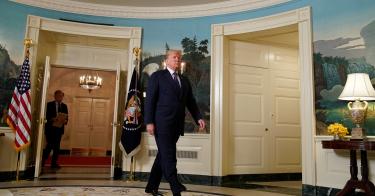By launching airstrikes against Syrian chemical warfare facilities, President Donald Trump reinforced the U.S. red line against the use of chemical weapons without expanding the military mission in Syria beyond the longstanding commitment to defeat ISIS.
The strikes Friday night were a necessary, appropriate, and carefully calibrated response to Syrian President Bashar Assad’s use of illegal chemical weapons. Assad had agreed to give up such weapons in a 2013 pact brokered by Russia, which guaranteed those weapons would not be used again in Syria.
At the time, Heritage Foundation analysts lambasted the agreement as “imprecise, unrealistic, and unlikely to be fulfilled.”
Moscow not only has failed to abide by its 2013 diplomatic commitment, but it has vetoed six U.N. Security Council resolutions on the issue.
Russia also has failed to comply with its deconfliction agreement with the United States on the ground, where it has deployed Russian mercenaries that have clashed with U.S.-backed forces in eastern Syria.
Russia has been an important ally and enabler of the Assad regime, which remains the principal perpetrator of the war crimes being committed in Syria. It is difficult to believe that Moscow is unaware of the atrocities being committed under its nose.
Assad’s Brutal Tactics
This is not the first time that the Assad regime has been caught red-handed using prohibited chemical weapons. In August 2013, a nerve gas attack in the Ghouta district of Damascus killed more than 1,400 people by U.S. government estimates.
The Obama administration considered a military response, but equivocated and acceded to a Russian diplomatic “solution” after the British Parliament rejected participating in a military operation to punish the Assad regime for the chemical attacks. Although Syria agreed to give up some chemical weapons, it continued to launch sporadic attacks on a limited basis, which the Obama administration chose to ignore.
In April 2017, Assad again was caught using chemical weapons. The Trump administration launched missile strikes at an air base used by warplanes involved in that chemical attack.
Friday’s strikes in retaliation for the Douma chemical attack were about twice as big as the April 2017 strikes, involved three targets (chemical research, storage, and command and control facilities) instead of one, and were joined by the United Kingdom and France.
Secretary of Defense James Mattis warned: “Clearly, the Assad regime did not get the message last year. This time, our allies and we have struck harder. Together, we have sent a clear message to Assad, and his murderous lieutenants, that they should not perpetrate another chemical weapons attack for which they will be held accountable.”
Trump’s Limited Goals
The missile strikes were strictly limited to targets related to Syria’s chemical arsenal, to punish the regime for its use of illegal weapons and deter future use.
Although the immediate military goal was accomplished, the overall mission will require continued monitoring and enforcement of the chemical warfare red line. It will be similar to mowing the grass. One strike will not be decisive, but nevertheless could be effective for a certain period.
The Trump administration avoided the pitfall of “mission creep.” It did not expand U.S. goals to include regime change or altering the Syrian balance of power, which would require a much greater military commitment over an extended period of time, with uncertain prospects for success.
That kind of mission creep would bog down U.S. military forces in Syria for years, fighting not only the Assad regime, but Hezbollah, Iran, and possibly Russia.
Regime change is a bridge too far. Once crossing it, the Trump administration would inherit the responsibility to spend more blood and treasure to cobble together the broken pieces of a failed state infested with hundreds of fractious militias, many of them fiercely anti-American.
While Assad has lost all legitimacy as the leader of Syria, his eventual removal from power should be a long-term diplomatic goal, not a military goal.
The Bottom Line
The primary U.S. military mission in Syria should remain the defeat of the Islamic State, or ISIS. Until the coffin is nailed shut on ISIS, U.S. military forces must remain actively engaged in finishing the job.
But as long as Assad remains in power, Washington must remain vigilant in punishing and deterring the use of chemical weapons.
The bottom line, according to The Heritage Foundation’s Luke Coffey:
Regrettably, President Barack Obama’s naiveté, combined with his failure to enforce his own red line in 2013 over the use of chemical weapons, planted the seed for this most recent attack. As with much of the Obama administration’s foreign policy, the Trump administration is left picking up the pieces. This chemical weapons attack in Douma is merely the latest example. Tragically, it is unlikely to be the last.
For more on this topic:
Trump’s Tomahawk Diplomacy in Syria
Chemical Attack in Syria Demands Stiff Response From US, Allies
After Missile Strike in Syria, Trump Must Avoid Mission Creep
Assad Is Using Chemical Weapons. How Trump Can Counter the Barbarism.
Time for the Obama Administration to Respond to Syrian Chemical Attacks
Framework for Removing Syrian Chemical Weapons: Reasons for Skepticism
Obama’s Ad Lib Syria Policy Puts Putin in Driver’s Seat
Syrian WMD: Counter-proliferation Contingency Planning Needed
This piece originally appeared in the Daily Signal



